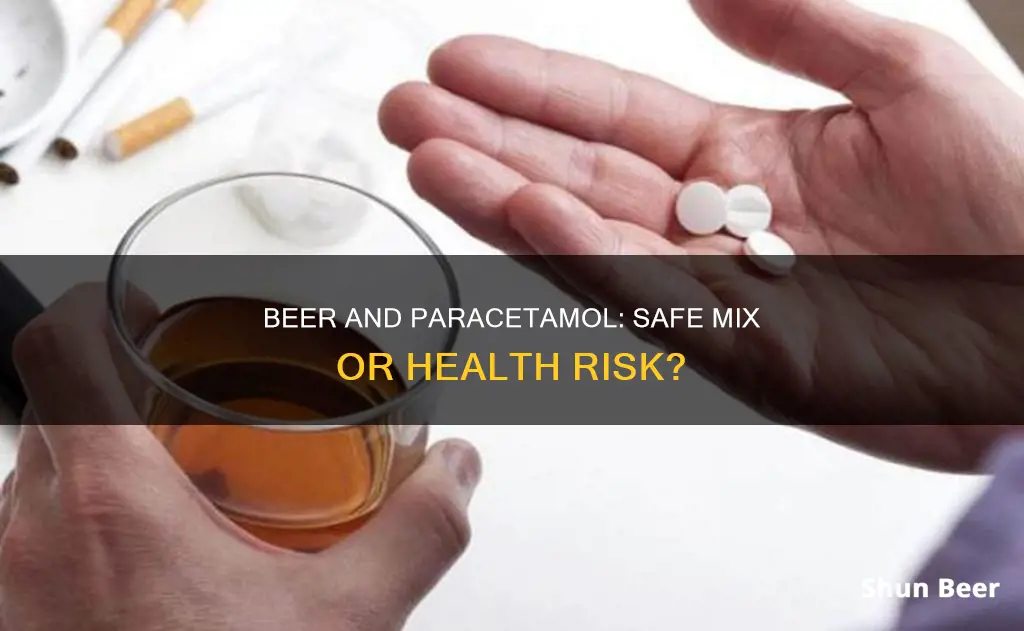
Drinking alcohol and taking medication can be a dangerous combination. While it is usually safe to drink a moderate amount of alcohol while taking over-the-counter painkillers such as paracetamol, it is important to be aware of the potential risks. Mixing paracetamol with alcohol can lead to nausea, vomiting, headaches, fainting, and loss of coordination. It can also increase the risk of liver toxicity, which can be fatal. Therefore, it is recommended to consult a doctor or pharmacist before consuming alcohol with any medication, including paracetamol. Additionally, those with certain health conditions, such as liver problems, should exercise caution when mixing alcohol and paracetamol.
| Characteristics | Values |
|---|---|
| Is it safe to take paracetamol after drinking beer? | It is usually safe to take a small amount of alcohol while taking paracetamol, as long as it does not exceed the recommended guidelines of no more than 14 units of alcohol a week. However, it may not be safe for those with certain health conditions, such as liver problems. |
| What are the risks of mixing paracetamol and alcohol? | Mixing paracetamol and alcohol can increase the risk of liver toxicity, which can be fatal. It may also reduce the effectiveness of the medication. |
| What are the side effects of mixing paracetamol and alcohol? | Nausea, vomiting, headaches, fainting, loss of coordination, and increased risk of liver damage. |
| Can I take paracetamol before drinking alcohol? | It is generally recommended to consult a doctor before using paracetamol if you drink alcohol regularly. You may need to avoid using paracetamol altogether or limit your alcohol consumption to prevent interactions and side effects. |
What You'll Learn

Paracetamol and alcohol can cause liver damage
Paracetamol, also known as acetaminophen, is a widely used over-the-counter drug to treat pain and reduce high temperatures. It is generally safe to consume a moderate amount of alcohol (no more than 14 units a week) while taking paracetamol, as long as you are not suffering from certain health conditions, such as liver problems. However, mixing paracetamol with alcohol may lead to nausea, vomiting, headaches, fainting, or loss of coordination. The combination of the two can also increase the risk of liver toxicity, which can be fatal.
Paracetamol is a widely used anti-pyretic that has long been established to cause liver toxicity when consumed above therapeutic levels. Paracetamol overdose, whether intentional or non-intentional, is the most common cause of drug-induced liver injury (DILI) in the United States and remains a global issue. When co-ingested with other medications, the rise in serum paracetamol levels may be delayed, altering medical management.
The interplay between paracetamol and alcohol is complex. Acute and chronic ethanol consumption have opposite effects. Chronic ethanol ingestion can cause induction of hepatic microsomal enzymes and increase paracetamol hepatotoxicity. However, acute ethanol ingestion can inhibit the microsomal oxidation of paracetamol, providing a protective effect against liver damage. This protective effect disappears when ethanol is eliminated, and the relative timing of ethanol and paracetamol intake is critical.
Chronic alcoholics are likely to be most vulnerable to the toxic effects of paracetamol during the first few days of withdrawal. While the possibility remains that chronic alcohol consumption increases the risk of paracetamol hepatotoxicity, there is insufficient evidence to support a major toxic interaction. Proper clinical studies investigating the alleged paracetamol-alcohol interaction are lacking, and acute liver damage has never been produced by therapeutic doses of paracetamol given as a challenge to a chronic alcoholic.
Beer Transfer Mechanics: How Does It Work?
You may want to see also

It is safe to take paracetamol with coffee
It is generally safe to take paracetamol with coffee, as there are no known adverse effects of the combination. In fact, adding caffeine to painkillers such as paracetamol can enhance its pain-relieving effects. However, it is important to be aware of the amount of caffeine consumed, as large amounts of caffeine in combination with paracetamol may increase the risk of adverse effects, including liver damage.
Paracetamol is a widely used over-the-counter drug for treating pain and reducing high temperatures. It is typically safe to take regularly for many years, as long as the recommended dosage is not exceeded. However, it is important to consult a doctor or pharmacist if you have certain health conditions, such as liver problems, before taking paracetamol.
Caffeine, on the other hand, is a stimulant that can be found in coffee, tea, and some soft drinks. It is generally safe for consumption but can have side effects such as nervousness, irritability, and sleeplessness when consumed in large amounts.
When taking paracetamol with coffee, it is important to consider the amount of caffeine in your coffee and the dosage of paracetamol. If you consume multiple cups of coffee per day or take regular painkillers for chronic pain, it is recommended to speak to a healthcare provider to determine an appropriate dosage of paracetamol.
Additionally, it is worth noting that paracetamol is available in combination with caffeine in certain formulations. These combinations are typically well-tolerated when used at approved doses, but it is important to limit the consumption of other caffeine-containing products while taking these medications to avoid excessive caffeine intake.
Beer: A Potential COVID-19 Killer?
You may want to see also

Paracetamol is safe to take with food or on an empty stomach
Paracetamol is a widely used over-the-counter (OTC) drug to treat pain and reduce fever. It is typically safe to take paracetamol with food or on an empty stomach. However, when it comes to consuming alcohol with paracetamol, caution is advised.
Paracetamol, also known as acetaminophen, is commonly used to alleviate mild fever and moderate pain. It is effective for headaches, toothaches, sprains, and cold and flu symptoms. It is important to follow the recommended dosage of 1 gram of paracetamol per dose and no more than 4 grams per day for adults. Overdosage or mixing paracetamol with certain substances can lead to severe side effects and even life-threatening complications.
Paracetamol is generally safe to take with food or on an empty stomach. It does not irritate the stomach lining, so you can choose to take it with or without food based on your personal preference. This flexibility makes it convenient for managing pain or reducing fever without disrupting your meals.
However, it is crucial to avoid mixing paracetamol with alcohol. Alcohol contains ethanol, and combining it with paracetamol may lead to nausea, vomiting, headaches, fainting, or loss of coordination. Additionally, both substances are metabolized by the liver, and high doses of both can increase the risk of liver toxicity, which can be fatal. Therefore, it is strongly advised to refrain from consuming alcohol when taking paracetamol, especially if you have liver problems or a history of alcoholism.
In summary, while paracetamol is safe to take with food or on an empty stomach, it is important to avoid mixing it with alcohol due to potential adverse effects, including liver damage. Always read the product leaflet, consult with your doctor or pharmacist, and follow the recommended dosage to ensure safe and effective use of paracetamol.
Beer Overdose: The Unfortunate Link to Erectile Dysfunction
You may want to see also

Paracetamol is not recommended for alcohol-related headaches
Paracetamol is a widely used over-the-counter (OTC) drug to treat pain and reduce fever. It is often used to treat symptoms of muscle pain, joint pain, toothache, headaches, and cold and flu. While it is generally safe to take paracetamol with a small amount of alcohol, it is not recommended for alcohol-related headaches.
Alcohol-related headaches are caused by histamine, which is found in alcohol. Drinking alcohol promotes the immune system to produce more of this chemical, leading to inflammatory reactions throughout the body. In addition, ethanol, the main ingredient in alcohol, is a trigger for alcohol-related headache symptoms.
When you have a headache after drinking alcohol, taking paracetamol is not a good idea. This is because the active ingredient in paracetamol can double the harm to your liver, affecting your health. The liver is the organ that removes toxins from the body. When you drink alcohol, the enzyme system in the liver cells metabolizes it, converting it into CO2 and water through a series of chemical reactions. However, the liver's capacity is limited, so if you take paracetamol on top of drinking alcohol, there is a risk of high liver enzymes and even acute or chronic liver necrosis.
Therefore, if you regularly drink alcohol, taking paracetamol, even in normal doses, can damage your liver. Instead of taking paracetamol for an alcohol-related headache, it is recommended to drink lots of water, especially lemon juice, to supplement Vitamin C and electrolytes, and limit the impact of alcohol on the nerves, thereby reducing the headache. Eating thin and hot foods can also help add sodium and potassium salts to aid the body's recovery.
Drinking Beer Without Gaining Weight: Is It Possible?
You may want to see also

Paracetamol is safe to take with beer in moderation
Paracetamol is a widely used over-the-counter drug to treat pain and reduce fever. It is also known as acetaminophen and is often recommended as the first line of treatment for mild to moderate pain. It is usually safe to take paracetamol with a moderate amount of alcohol, such as beer, as long as you follow the recommended guidelines for alcohol consumption and paracetamol dosage. However, it is important to note that both paracetamol and alcohol are processed by the liver, so consuming excessive amounts of both can increase the risk of liver damage.
When taking paracetamol, it is important to follow the recommended dosage to avoid any potential side effects. For adults, the recommended dose is 1 gram of paracetamol per dose and no more than 4 grams (4000 mg) per day. If you consume more than this, you may experience liver toxicity, which can be fatal. Therefore, it is crucial to read the product leaflet, carefully check the ingredients, and consult your doctor or pharmacist if you have any concerns.
If you have certain health conditions, such as liver problems, it may not be safe for you to drink alcohol while taking paracetamol. It is always advisable to check with your doctor or pharmacist before mixing paracetamol with alcohol, especially if you have any underlying health issues or are taking other medications. They can provide personalized advice based on your individual circumstances.
Additionally, it is important to be mindful of the amount of alcohol you consume when taking paracetamol. The recommended guidelines suggest no more than 14 units of alcohol per week, which equates to approximately 2 to 3 units of alcohol in a pint of lager or beer. Staying within these limits can help reduce the risk of adverse effects when taking paracetamol with alcohol.
In summary, paracetamol is generally safe to take with beer in moderation. However, it is important to follow the recommended dosage for paracetamol, stay within the guidelines for alcohol consumption, and seek advice from a healthcare professional if you have any concerns or underlying health conditions.
Drinking Beer on Thai Beaches: What's Allowed?
You may want to see also
Frequently asked questions
It is generally safe to take a small amount of alcohol while taking paracetamol, but it is important to stay within the recommended guidelines of no more than 14 units of alcohol per week. However, if you have certain health conditions, such as liver problems, it may not be safe to mix paracetamol and alcohol.
Both paracetamol and alcohol are broken down by the liver, so combining high doses of both can lead to side effects, including liver damage. Alcohol can also reduce the effectiveness of paracetamol.
It is not recommended to take paracetamol to relieve a headache after drinking alcohol as it can double the harm to the liver. Instead, it is recommended to drink plenty of water, especially lemon juice, to help reduce the impact of alcohol on the body.
It is generally safe to drink a moderate amount of alcohol while taking over-the-counter painkillers such as ibuprofen. However, it is important to consult a doctor or pharmacist for advice and to ensure you do not exceed the recommended dose.
It is generally safe to drink a small amount of alcohol while taking paracetamol, but it is important to stay within the recommended guidelines. However, if you are a regular drinker, it is advisable to check with your doctor before taking paracetamol to avoid any potential interactions or side effects.







